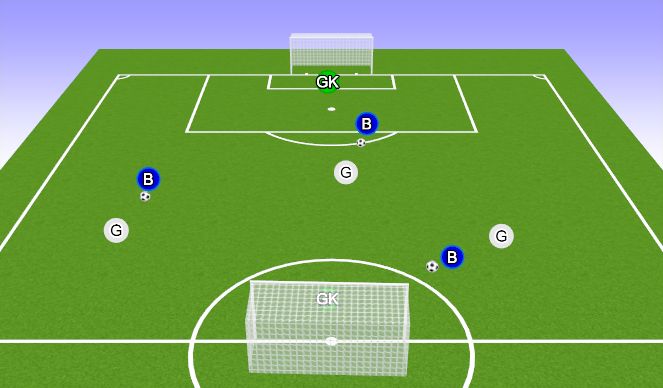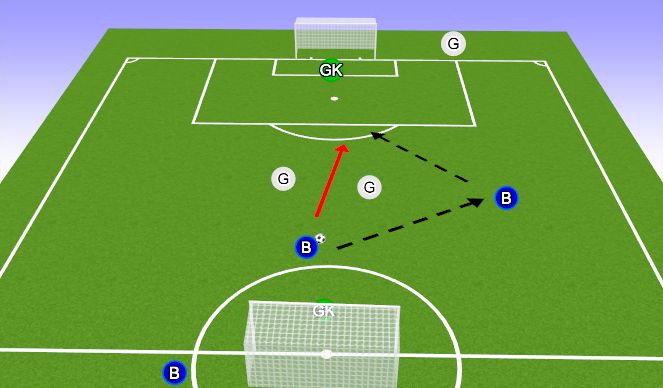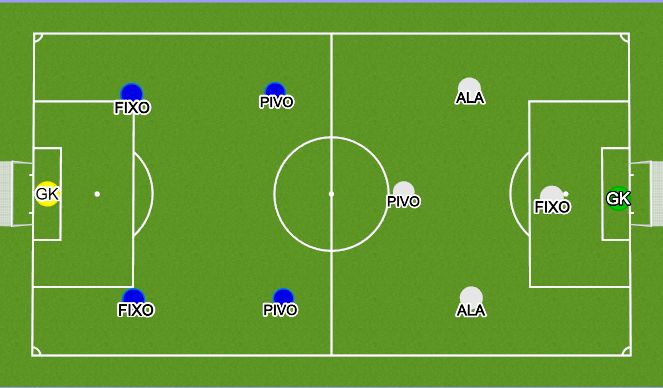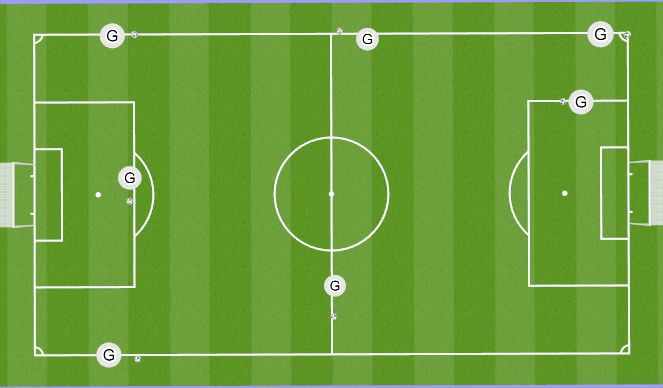Football/Soccer Session (Academy Sessions): Futsal Dribbling 2 (Start Time: 11-Feb-2022 18:30h)

Profile Summary

| Name: | Mckay Kozielski |
|---|---|
| City: | Clovis |
| Country: | United States of America |
| Membership: | Adult Member |
| Sport: | Football/Soccer |
Description
What: Improving attacking skills.
Why: To build confidence on the ball.
When: Players are in 1v1s.
Where: Anywhere on the court.
Who: Ala, Fixo, Pivo

See the guidance at the top of this page to understand why you are not seeing interactive Football/Soccer images.

3v3(1v1,1v1,1v1) (10 mins)
Organization:
Three pairs of players play 1v1 on half a court. Each pair has one ball and attempts to score on their respective goalkeeper.
Coaching Tips:
Beating a player from a standing start hinges on the
forward’s ability to wrong-foot the defender and get
past them at the right moment. Conversely, beating
a player from a running start hinges on being able to
accelerate rapidly.
The player with the ball who wants to dribble past a
defender must first run directly at them, trying to do so
at the fastest possible speed. This means they must get
close to the defender with the ball before taking them
on with a combination of feinting and dribbling.
A feint is executed by a player just before they try to
get past their opponent. Basically, this involves the
player on the ball making the opposition player think
they have opted for one way of getting past them
before finally making the intended movement.
A successful feint wrong-foots the defender, enabling
the forward to beat their man.
Less Challenging:
Make the space larger; have defenders start behind the end line to provide the attacker with more time on the ball.
More Challenging:
Shrink the space; introduce more difficult skills to practice; encourage players to use their weak foot.

See the guidance at the top of this page to understand why you are not seeing interactive Football/Soccer images.

2v2 to Goal (20 mins)
Organization:
To improve decision-making skills in group
attacking and defensive aspects of the game,
starting with a 2v2 scenario. To work on basic
small-group technical/tactical options.
Coaching tips:
One-two
A player passes to the supporting team-
mate and then runs off the ball into space
behind the marker to receive the ball back
from the supporting player. This option is
normally used in 2v2 situations to create a
2v1, by drawing a defender away from their zone.
Overlap
This is where two team-mates cross
over. An attacker goes on a bending run
from their position around the player in
possession, aiming to receive the ball or
cause confusion in the defense at the
moment of the crossover. This confusion
can then be exploited by the player on the
ball.
Parallel move
An attacker runs off the ball (not
necessarily after a pass) into the space
behind the defender marking the player
in possession, in order to receive a pass.
This is known as a parallel run because it
is normally made when the ball is on the
wing and the player making the move off
the ball receives the pass down the line.
Back-door cut with player on the ball
reading the play and playing a pass
A player drops back down the wing towards
their goal, taking their marker with them,
thereby creating space that they can then
run into behind
Less Challenging:
Increase the playing area.
More Challenging:
Unlimited number of touches until the first
goal, then three touches until the second
goal, then two touches until the third goal,
one touch after the third goal except after
regaining possession (when two touches are
allowed).

See the guidance at the top of this page to understand why you are not seeing interactive Football/Soccer images.

Implementation (30 mins)
Organization:
Free play 1-2-2 against 1-1-2-1. !0 minute halves with no restrictions.
Encourage movement to get open and rotational play!









 Play animation
Play animation Play step-by-step
Play step-by-step Repeat (toggle)
Repeat (toggle) Full Screen
Full Screen Pause
Pause Stop
Stop
Line Dribbling (10 mins)
Organization:
Each player should dribble the ball around the
edge of the court. Upon the coach’s signal,
they should enter the court and dribble freely,
changing direction and pace. They return to the
edge of the court upon the coach’s next signal.
Coaching Tips:
The player must use light touches to ensure
they keep the ball as close to their feet as
possible.
Ball control is more important than speed.
The player should run with short, quick
steps.
Keeping the head up while dribbling
is vitally important to the subsequent
development of an attacking move.
Less Challenging:
Restrict who enters the middle of the court by assigning numbers to specific players.
More Challenging:
Make the exercise into a race to see who can perform the skill and return to the edge of the court first.